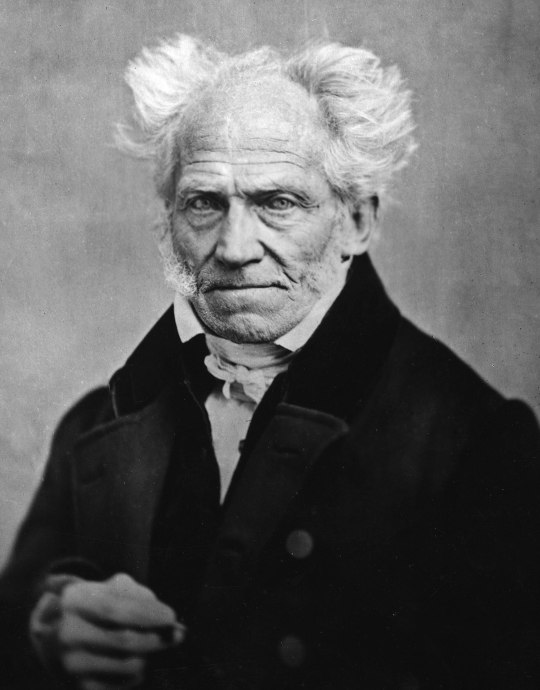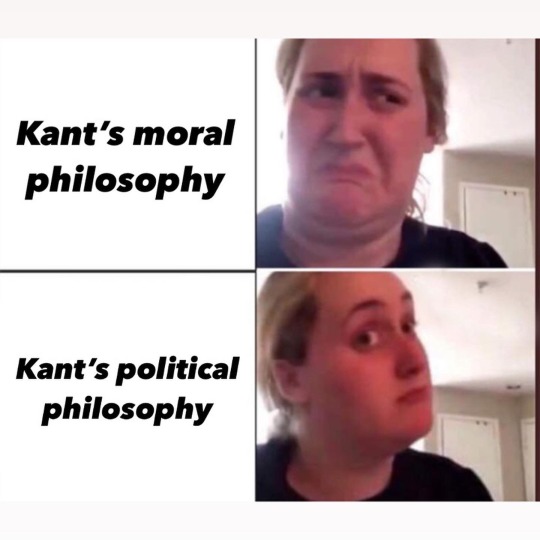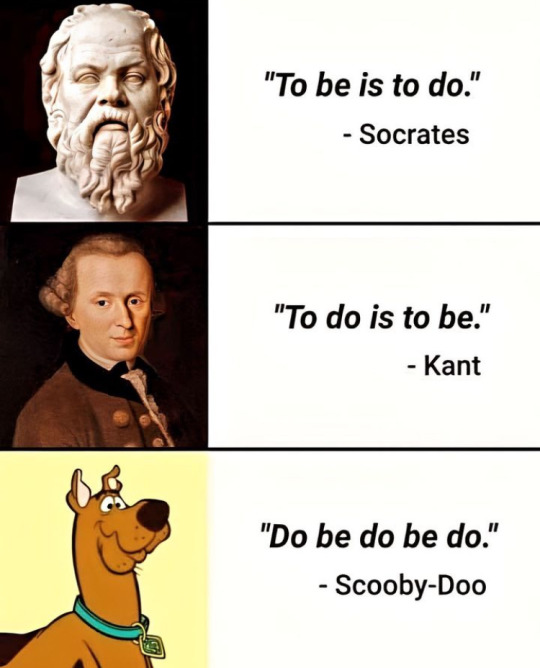#Kantianism
Text
#immanuel kant#poll time#david hume#john locke#voltaire#mary wollstonecraft#rousseau#philosophy#ethics#enlightenment#kantianism#categorical imperative#196#categorical imperatives#morality#children
80 notes
·
View notes
Text
Philosophy poll because I’m drunk and cringe.
73 notes
·
View notes
Text
“A high degree of intellect tends to make a man unsocial.”

Arthur Schopenhauer was a German philosopher. He is best known for his 1818 work The World as Will and Representation.
#Pessimism#Will and Representation#Metaphysics#Ethics#Existentialism#Philosophy of Mind#Kantianism#Aesthetics#Solipsism#Nihilism#Idealism#Compassion#Individualism#World as Illusion#Transcendental Idealism#Suffering#The Fourfold Root of the Principle of Sufficient Reason#Eastern Philosophy Influence#Art and Beauty#Critique of Hegel's Philosophy#today on tumblr#quoteoftheday
25 notes
·
View notes
Text

#immanuel kant#kant#kantianism#philosophy memes#philosophy#philosophy meme#deontology#deontological ethics#political philosophy#legal philosophy#natural rights#social contract#classical liberalism#libertarianism#minarchism
48 notes
·
View notes
Text
I am no Kantian by any means (if I was, I’d be considered heavily immoral lol) but I hate how misunderstood Kantianism is.
It’s not bad to be amoral, there’s nothing wrong with doing things in accordance with duty. It’s just that what you’re doing isn’t exactly moral. It’s the difference between an A and a B on a paper. Both pass, one is just better.
Like why would you be considered moral for rescuing a puppy because you want a puppy? It would be moral if perhaps you wanted a purebred but you rescued instead, but doing something you want and it just happens to align with duty doesn’t make you special or moral or anything of the like. It’s still good that you rescued the puppy, but it’s not moral, it’s just amoral.
#i’m just regurgitating my professors lectures but mfs gotta start arguing as if being amoral is wrong#wtvr#gen#jtxt#philosophy#kantianism#i’m a utilitarianist through and through tbh
7 notes
·
View notes
Text
On Knowledge
Do the Colours Make the Rainbow?: Knowledge as impropriated fragments of universal absolutes and mathematics as atomic truths
If knowledge is based on a truth, and truth (as we "know" it) is defined as being a universal absolute that we can reach and/or experience through our limited senses and neurocognitive capabilities, then our understanding truth is ultimately limited to how much we can possibly perceive and hence interpret it. The moment an individual reaches a truth, they absorb it, complete it with their apriori, and make it "theirs". This sense of posessiveness is where belief is formed, because it is based on the personalisation of a universal absolute. One person's knowledge of a truth, while based on the same universal absolute, cannot be the same as anybody else's simply because it passes through the filter of their minds as they have been formed with the unique combinations of synaptic nervous tissue. One could debate that there are such simple, undividable atoms of truth that they cannot be fragmented to a smaller piece to be corrupted with the individuality of other people. Perhaps we already found it through mathematics.
My contribution to the discussion of what knowledge is, what it could be, and how much we can have it.
Even then one could debate that the labels we have assigned to things and the concepts of things, be it mathematics of logic and language, can convey only a sliver of the truth that is trying to be captured. By assigning the noun "pen" to a pen, we have chosen one possibility out of the nigh infinite possible combinations of letters that can form logically sensible morphemes. If the infinite potentiality of an object is not captured, can one say that we have truly defined that object?
#writeblr#philosophy#epistemology#kantianism#night thoughts#quotes#wisdom#philosopher#plato#cartesian#JTB#motivation#philosophyquotes#inspiration#quoteoftheday#philosophymemes#thoughts#nature#philosophical#filosofia#mind#mindfulness#knowledge#truth#quote#think#science
2 notes
·
View notes
Text
If I were to chain Immanuel Kant to a radiator, would he still be free?
0 notes
Text
some of you are kantian bitches and like. that explains SO MUCH about you
0 notes
Text

one is a beloved and respected philosopher, one is adored by children, and yet i am both
#immanuel kant#socrates#scooby doo#philosophy#ethics#kantianism#categorical imperative#to do is to be#to be is to do#196#morality
29 notes
·
View notes
Text
[...] black people’s relation to the world of objects cannot be properly understood in the terms of what Quentin Meillassoux calls Kantian correlationism or of the question of perceptual integrity between subject and object, as black peoples’ fungibility with objects is a primary function of blackness in “the” world (in the making of “the” world) and forms an essential condition of possibility for both Kant’s questioning of subject-object relations and the emergence of globality as a conceptual horizon. So for black people it is not that the question of perceptual integrity is not a problem for contemplation; rather, the question of subject-object is thought in a world that primarily annunciates blackness as the fungibility of people and objects while steadfastly equating subjecthood with the possession and dispossession of objects (human and nonhuman)—objects that necessarily haunt the distorted perceptual terms of the Kantian-subject and thought-world relationship, whereby black mater signifies the formlessness of noise, and noise is produced as isomorphic to black mater, reciprocally. Therefore, black contemplation of the question of subject-object, including thought that exceeds its logic, must contend with and cannot help but occur in a context effected by the indistinction and distortion race introduces into these very terms.
Given Man’s historical horizon of possibility—slavery, conquest, colonialism—the Western metaphysical matrix has race at its center in the form of a chiasmus: the metaphysics of race (“What is the ‘reality’ of race?”) and the racialization of the question of metaphysics (“Under whose terms will the nature of time, knowledge, space, objecthood, being, and causality come to be defined?”). In other words, the question of race’s reality has and continues to bear directly on hierarchies of knowledge pertaining to the nature of reality itself.
Zakiyyah Iman Jackson, Becoming Human: Matter and Meaning in an Antiblack World
#quote#zakiyyah iman jackson#antiblackness#philosophy#metaphysics#kantianism#slavery#colonialism#imperialism#afropessimism#*ayden
1 note
·
View note
Text
i think the funniest fashion industry thing is when theyre like "oh uh well the models have to be super thin because the clothes just hang better" ohhh ya my mistake i see. the universal aesthetic standard of fabric drapery that pre-dates any preference for the thin bodies underneath. i guess it's really fortunate for you guys that those two things just so happened to line up like that huh
138 notes
·
View notes
Text
We, as a fandom, keep on brushing off how absolutely down with murder Kagome actually was, like, this 15 years old entire moral compass was: "killing is wrong (unless they deserve it)" and that's so sexy of her.
#My girl was a walking Kantian nightmare and I wouldn't have her any other way#I'm so serious like#If she was one of those 'if we kill the big bad villain we're just as bad as him' kind of characters...#I'd probably not love her as much as I do#Sidposting#Kagome#Kagome Higurashi
540 notes
·
View notes
Text
one of the things i love most about arc 2, i think, is the breaking down of "this action is always bad" from arc 1 into "this action is always circumstantial" in arc 2. not that arc 1 is devoid of morality complexity and ambiguity, but there's definitely more examinations of said things and said unforeseen consequences in arc 2.
in arc 1, Claudia doesn't break away from her father (isn't familial morality good?) and Rayla does (becoming the first real traitor in the series in a lot of ways). In arc 1, Nyx is our primary (bad) thief who steals for self-centred (monetary) reasons, but in S5 we see both Ezran and Rayla engage in thievery with good intentions, even if for Rayla it is also for 'monetary' reasons (ha!) and Callum spares/helps her much the way Rayla spared/helped Nyx, even after being 'tricked' and certainly lied to. Nyx's thievery has the least consequence with Ezran's having the most, but their intentions (to return a baby creature for money / to save baby creatures from a truly terrible fate and existence) is what divvies up the actions accordingly.
Soren and Terry are both crestfallen and wracked with guilt upon killing someone - for Soren, his father, which is extra complicated given that Viren clearly paid quite a steep price to keep his son alive; for Terry, a relative stranger - but both murders affect them in similar ways. For Terry, it was something he'd never been trained to do and wholly in defense of someone he loves; for Soren, it was fulfilling his purpose as a knight and a crownguard for someone he loves, but also reflective of the strength it took to stand up against his father for what was right.
When Callum breaks away from Aaravos in future seasons, he will be retreading Viren's path in 5x09. Claudia and Rayla continue to parallel each other quite strongly, particularly with 6x01 in mind. Callum, like Viren and Claudia, has used dark magic two times now for Good reasons, yet is clearly still worried by what path it may set him on, while Viren is forced to recognize his own agency (much like Callum did in S2).
IDK if this makes sense but I really like the way TDP takes intention, circumstance, and consequence into account, and doesn't let any character off the hook for their choices within those circumstances, but also doesn't demonize any of them for their choices either
#tdp#the dragon prince#the cycle#like what are we kantians#it is funny tho how the show routinely treats lying as like#the most minimal issue to have ever#which like tracks bc it's like. WE'RE WELL PAST THAT#next to stealing i guess. big bois only care about Murder and even then#mini meta#analysis series#the gang's all here
78 notes
·
View notes
Text
Classic bit of ethics that you "don't instrumentalize people, don't treat people like objects" but when it looks like someone's going out of their way to not instrumentalize you (Including an employer but not only) that ends up being a red flag, that's someone who's going to obsequiously nice and then when the time comes really put the screws to you, perhaps it means that they're engaged in elaborate self-deception.
24 notes
·
View notes
Video
youtube
Kantianism
"THOUGHTS WITHOUT CONTENT ARE EMPTY, INTUITIONS WITHOUT CONCEPTS ARE BLIND. THE UNDERSTANDING CAN INTUIT NOTHING, THE SENSES CAN THINK NOTHING. ONLY THROUGH THEIR UNISON CAN KNOWLEDGE ARISE".
IMMANUEL KANT
#youtube#kantianism#philosophy of mind#immanuel kant#kantian ethics#education#categorical imperative#inna besedina#historyandphilosophy
5 notes
·
View notes